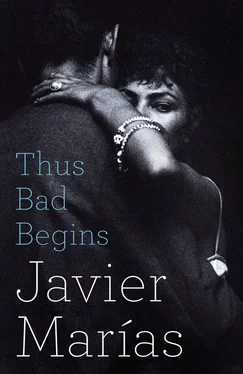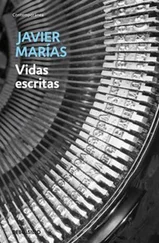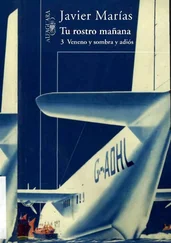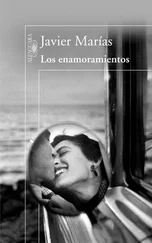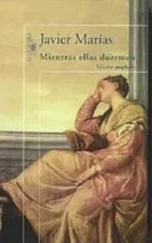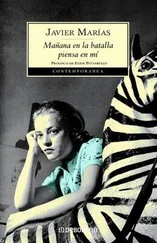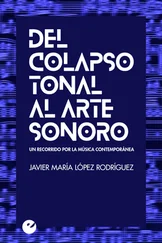Van Vechten’s features suggested a triumphant, expansive nature, as did the way he behaved in public: with enormous confidence, perennial good humour, too perennial not to seem somewhat false — although perhaps suitable for a paediatrician who needed to instil confidence in mothers and children — with undeniable joviality and a constant, welcoming smile, a man who told jokes, clean or dirty depending on the company he was in, and who was always joshing, perhaps too much — as if this were his visiting card — a kind of easy humour that nevertheless seemed to me old-fashioned (but perhaps that was normal, given that we were separated by many calendar years) and which I perhaps unfairly associated with the long, fast-receding Franco era, but it might have been just the same under a completely different regime. When he was a child, someone must have told him: ‘You have such beautiful teeth, Jorgito, you should always smile, whether it seems appropriate or not; that will win you good friends and goodwill; it will help smooth your path.’ He was very tall, almost as tall as Muriel or possibly taller, and very solidly built. That’s why, I think, he was much given to slapping people on the back, to grabbing their arm, which he would then tug or shake in jocular fashion while laughing a strangely mechanical laugh; he was very strong and could doubtless have inflicted harm had he wanted to, indeed, I was sometimes left slightly bruised whenever he gave me a friendly shove or placed one of his huge hands on my shoulder, which felt as if a great paw had fallen from a considerable height and then gripped me with what was intended to be affection, but which felt more like the paw of a lion and provoked in me an immediate urge to shrug it off and free myself from both its weight and grip.
Alongside that good humour, one sensed something voracious and troubling, as if nothing ever entirely pleased him, as if he were one of those people for whom nothing is ever enough, who always want more and who reach a point when they no longer know what more they can want: it’s difficult for them to be more successful, earn more money, more admiration from the people surrounding them, more power or influence in the world they move in. They look around, flail vainly about in search of new goals, and don’t know how to channel all the ambition and energy that continue to beset them, how to raise the siege, to strike camp. You might say that age has betrayed them, has failed to teach them its usual soothing lessons; it neither softens nor makes them slower or meeker, it has too much respect for their personality and doesn’t know what to do with them or else simply doesn’t bother to please, still less satisfy them. They thus become creatures who are barely aware of passing time, and instead time feels to them like a kind of unvarying eternity in which they have lived their entire life and which looks unlikely to disappear or to change in pace, to withdraw from or abandon them: they are time’s hostages or its willing victims; it must be said in their defence that time acts most disloyally in partly failing to fulfil its commitment to them: it merely slowly, little by little, undermines them, but — how I can put it? — without telling them. They are individuals who, if you told them they had a fatal illness and would soon die, would react with immediate and utter incredulity or scepticism — with disdain, in fact — as if to say, more or less: ‘Look, I’m awfully sorry, but it really doesn’t suit me to die right now. I’ve got such a lot to do, and I wasn’t expecting it, it wasn’t part of my short-term plan. If you don’t mind, could we leave it for later on?’ (And that’s perfectly understandable really, because, with the exception of suicides and those who are old and tired of life, who doesn’t want to leave it for later on, however late in the day that ‘now’ presents itself?) Muriel, on the other hand, would never have said that, even though, as I mentioned at the beginning, he shared with Van Vechten a certain immunity to the passage of time, and the years seemed to have little effect on his appearance or perhaps only that of a slow fall of sleet or a faint shadow. However, unlike his friend, there was no voracity or disquiet in him, no vague dissatisfactions, there was, rather, stillness and pause and calm: he merely ignored the passing of time, as if it were so familiar that it wasn’t worth devoting a single minute to bemoaning or pondering it. Or as if all the really important things had happened to him in the past.
In Van Vechten’s search to satisfy his permanent, albeit aimless and directionless greed, nothing could have suited him better than my suggestion, or what he perceived as my temptations, that of being introduced, with the help of a guide or an initiate, into the wild, youthful life of the day. He didn’t really need me, because the times were so effervescent that suddenly everything seemed permissible and normal in contrast to the leaden decades under Franco, although those days had already died a good five years before the dictator’s actual physical disappearance, or perhaps we had merely decisively turned our back on them. People of any age felt free to go anywhere, as though everyone were trying out new habits or perhaps a new youth. Those who, not long before, and because of their age, had felt they weren’t ‘authorized’ to go out several nights a week and stay out into the small hours, now had a sense that nothing prevented them from doing so; more than that, the general buzz and excitement seemed to be urging them to venture into places that would have been deemed inappropriate for someone of their age or position, for someone who had for so many years behaved with a certain dignity and composure. Despite all these possibilities, all these stimuli, it was not the same as having a real twenty-year-old taking you to all the fashionable bars and clubs and introducing you to his friends and, so to speak, giving you permission to approach any girl in his circle as an equal and allowing you the illusion that you were part of a kind of privileged band. It was a time when almost no one slept in Madrid, because after a night on the town, with the exception of students and artists and professional layabouts, every night owl, unlikely though it may seem and at a remarkably early hour, could be found at his or her desk the following morning. I was and so was Van Vechten, who never once missed a day in his consulting rooms, and it was the same with Muriel and Rico and Roy and Beatriz and Gloria when they stayed out late, as they all did now and again; no one could entirely avoid the nocturnal ferment of those anomalous years, which, if you had a bit of money and however wretchedly unhappy you felt, were celebratory despite the political unease and the uncertainties of all kinds. It was not unusual to find traffic jams in various parts of the city in the early hours of a Wednesday or a Monday or even a dull Tuesday. On some nights, our cold, sentinel moon must have blinked its one somnolent eye in disbelief.
I get them mixed up, the bars I used to go to in 1980 and those I went to shortly before and shortly afterwards, but in addition to the places I mentioned earlier, I think I took Van Vechten to the Dickens, El Café and Rock-Ola, to certain street cafés in Recoletos and to the Universal (on second thoughts, no, that was probably later), and to various discotheques, where, of course, I spent far too many hours, whether with him or on my own, I can’t for the life of me remember, places like Pachá and Joy Eslava and others whose names escape me, one near the river (La Riviera?) and another next door to Chamartín station, and another in Calle Hortaleza and yet another in Fortuny or Jenner or Marqués del Riscal (Archy perhaps?), times and people tend to get confused, alcohol doesn’t exactly clear the head, although cocaine does for as long as its effects last, but not a posteriori; someone would offer you a line of coke now and then and you took it just to be able to keep going a little longer and sustain the bellowed conversations that you somehow kept up in a losing battle with the surrounding hubbub. I didn’t go to all those places with the Doctor, and I only did so for a short time, getting rid of him as soon as my mission was complete. One place I definitely did take him to was an updated, refurbished nightclub called Pintor Goya (the name it was given in its antiquated origins), in the street of the same name, that is, Goya.
Читать дальше
